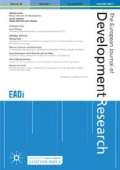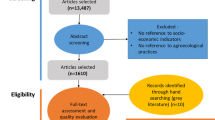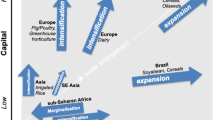Abstract
This article focusses on mechanical farming technology sponsored by Brazil’s South-South cooperation in Africa. Tractors and matracas are taken as symbols of different agricultural development pathways promoted by Brazilian players. One stark contrast is between high-powered mechanised farming and no-till conservation agriculture. Another is between large-scale agriculture and small-scale family farming. Embrapa, widely known as the champion of the Green Revolution in Brazil, has also encouraged a conservation route and the use of no-till and small-scale equipment, such as matracas. The Brazilian Ministry of Agrarian Development, leading advocate of family farming and of political opposition to large-scale farming, has inadvertently sponsored tractors, feeding a new wave of mechanisation across Africa that overlooks the potential of smaller-scale alternatives. Brazilian actors and their African counterparts have instrumentally deployed technology, and tractors particularly, in the pursuit of their interests, whereas considerations about technological appropriateness to local conditions have hardly played a role.
Abstract
Ce document se concentre sur une technique mécanique d’élevage subventionnée par la coopération Sud-Sud du Brésil en Afrique. Les tracteurs et les matracas sont utilisés comme symboles des différents parcours de développement agricultural favorisés par les acteurs brésiliens. Il existe un contraste important entre l’agriculture mécanisée à forte puissance et l’agriculture de conservation sans labour. Il existe également une différence entre l’agriculture à grande échelle et la petite agriculture familiale. Embrapa, mondialement connu comme le champion de la Révolution Verte au Brésil, a également encouragé une route de maintien et l’utilisation de petites installations et d’installations pour la culture sans labour, comme, par exemple, les matracas. Le ministère brésilien du développement agraire, le principal défenseur de l’exploitation familiale agricole et de l’opposition politique à l’agriculture à grande échelle, a involontairement subventionné des tracteurs, alimentant ainsi une nouvelle vague de la mécanisation en Afrique, ce qui néglige le potentiel des alternatives à plus petite échelle. Les acteurs brésiliens et leurs homologues africains ont instrumentalement déployé les technologies, et les tracteurs en particulier, à la poursuite de leurs intérêts, tandis que les préoccupations au sujet de la conformité technologique par rapport aux conditions locales, ont à peine joué un rôle.


Similar content being viewed by others
Notes
de Janvry (1978) classifies technology into four types: mechanical (which includes ploughing, harvesting and processing machinery), biological (seeds and cattle breed), chemical (fertilisers and pesticides) and agronomic (cultural practices and management techniques such as crop rotation, forage reserves, fertility tests and so on).
www.agra.org/who-we-are/our-story/, accessed on 9 October 2015.
Bryceson defines ‘deagrarianization’ as ‘a long-term process of occupational adjustment, income-earning reorientation, social identification and spatial relocation of rural dwellers away from strictly agricultural-based modes of livelihood’ (Bryceson, 2002, p. 726).
FAO defines conservation agriculture as ‘an approach to managing agro-ecosystems for improved and sustained productivity, increased profits and food security while preserving and enhancing the resource base and the environment’. Minimum mechanical soil disturbance is identified by FAO as one of the principles of conservation agriculture (the other are permanent organic soil cover and crop diversification) (www.fao.org/ag/ca/1a.html, accessed on 9 October 2015).
Diao et al (2014, p. 169) document the importation of tractors, from either Chinese or Indian origin, by the governments of Angola, Benin, Burkina Faso, Burundi, Cameroon, Chad, DRC, Guinea-Bissau, Mali, Nigeria, Swaziland and Tanzania.
The extent to which similar trends are noticeable in other African countries would need to be demonstrated – for example, Jayne et al (2013) provide evidence on the gradual shrinking size of farms in most of Sub-Saharan Africa, as result of rural population growth exceeding growth in arable land.
It was during the 1970s and 1980s that the first wave of mechanisation in African agriculture took place, in the post-colonial period. A second wave is now underway with the recent interest in agriculture and public investment in the sector (Diao et al, 2014).
Embrapa respondent 11, interviewed in Rio de Janeiro in March 2014.
Mozambican government official, interviewed in Maputo in July 2012.
Embrapa respondent 2, interviewed in Nampula in March 2014.
Embrapa respondent 12, interviewed in Brasília in July 2014.
Embrapa respondents 16, 17 and 19, interviewed in Brasília in July 2014.
Embrapa respondents 5 and 7, interviewed in Brasília in July 2014.
Mozambique Ministry of Agriculture official 2, interviewed in Maputo in February 2014.
Embrapa respondent 22, interviewed in Accra in March 2012.
Embrapa researcher, interviewed in Nampula in March 2014.
Embrapa researchers 16 and 19, interviewed in Brasília in July 2014.
For example, MDA respondent 1, interviewed in Brasília in November 2013 and industry representative interviewed in S. Paulo in July 2014.
MDA respondents 4, 6 and 7, interviewed in Brasília in July 2014.
MDA respondent 2, interviewed in Brasília in November 2013.
Industry representative, interviewed in S. Paulo in July 2014.
Like Ghana, the Mozambican government had announced the establishment of service provision centres (Centros de Prestação de Serviços) that would rent out tractors procured by the government to small-scale farmers (Notícias Online, 2015a, 2015b).
Mozambique Ministry of Agriculture official 2, interviewed in Maputo in February 2014.
It is worth noting that, in 2014, the Brazilian government established a National Policy for Agroecology and Organic Production, a process strongly supported by the MDA (www.mda.gov.br/planapo/).
References
ABC (2010) Diálogo Brasil-África em Segurança Alimentar, Combate à Fome e Desenvolvimento Rural. Brasília, Brazil: Agência Brasileira de Cooperação.
ABC (2011) Brazilian Technical Cooperation. Brasília: Brazilian Cooperation Agency (ABC), Ministry of External Relations.
ABIMAQ (2014) Mais Alimentos Gana – 1st tranche. Associação Brasileira da Indústria de Máquinas e Equipamentos, http://www.abimaq.org.br/download/dia/srrp1/2014/5/pmai_listaprecificadadeprodutos.pdf, accessed 4 February 2015.
Abreu, F.J.M. de (2013) A evolução da Cooperação Técnica Internacional no Brasil [The evolution of international technical cooperation in Brazil]. Mural Internacional 4 (2): 3–16.
African Union (2014) Malabo Declaration On Accelerated Agricultural Growth and Transformation for Shared Prosperity and Improved Livelihoods Doc. Assembly/AU/2(XXIII). African Union, June.
Agyei-Holmes, A. (2014) Walking the tight rope of tillage technology choice: The Peasant’s dilemma in the Ubaruku village of Tanzania. Open University, http://www.globelicsacademy.net/2013_students.html, accessed 3 October 2015.
Amann, E. and Barrientos, A. (2014) Is There a New Brazilian Model of Development? Main Findings from the IRIBA Research Programme. Manchester, UK: The University of Manchester. IRIBA Working Paper No. 13.
Amanor, K. (2013) Expanding agri-business: China and Brazil in Ghanaian agriculture. IDS Bulletin 44 (4): 80–90.
Amanor, K. (2015) The tractorisation of Ghana: Agricultural technocentricism and more food. China and Brazil in African Agriculture (CBAA), Future Agricultures Consortium (FAC) (mimeo).
Amorim, C. (2010) Brazilian foreign policy under President Lula (2003–2010): An overview. Revista Brasileira de Política Internacional 53 (special edition): 214–240.
ANA (2012) Embrapa: ‘As instituições científicas se colocam a serviço das corporações do agronegócio’, http://www.agroecologia.org.br/index.php/noticias/344-embrapa-a-ciencia-esta-a-servico-da-legitimacao-de-um-determinado-padrao-que-fortalece-o-capital-do-agronegocio, accessed 5 October 2015.
Anseeuw, W. (2013) The rush for land in Africa: Resource grabbing or Green Revolution? South African Journal of International Affairs 20 (1): 159–177.
Baudron, F. et al. (ND) Appropriate and equitable mechanization in Africa through conservation agriculture, use of two-wheel tractors, and involvement of the private sector. Conservation Technology Demonstration Centre, http://www.ctic.org/media/pdf/WCCA/05_Frederic%20Baudron.pdf, accessed 3 September 2015.
Biggs, S. and Justice, S. (2015) Rural and Agricultural Mechanization: A History of the Spread of Small Engines in Selected Asian Countries. Washington DC: International Food Policy Research Institute. IFPRI Discussion Paper 01443.
Binswanger, H. (1986) Agricultural mechanization: A comparative historical perspective. The World Bank Research Observer 1 (1): 27–56.
Blaustein, R.J. (2008) The Green Revolution arrives in Africa. BioScience 58 (1): 8–14.
Breisinger, C., Diao, X., Thurlow, J. and Hassan, R.M.A. (2011) Potential impacts of a Green Revolution in Africa – The case of Ghana. Journal of International Development 23 (1): 82–102.
Bryceson, D.F. (2002) The scramble in Africa: Reorienting rural livelihoods. World Development 30 (5): 725–739.
Cabral, L. (forthcoming) Brazil’s contested agronomy for Africa: Insights from Embrapa’s knowledge encounters in Mozambique. (Paper submitted for publication to Journal of Development Studies, August 2015).
Cabral, L., Favareto, A., Mukwereza, L. and Amanor, K. (2016) Brazil’s agricultural politics in Africa: More Food International and the disputed meanings of ‘family farming’. World Development 81 (May): 47–60.
Cabral, L., Shankland, A., Favareto, A. and Costa Vaz, A. (2013) Brazil-Africa agricultural cooperation encounters: Drivers, narratives and imaginaries of Africa and development. IDS Bulletin 44 (4): 53–68.
Castro, E. (ed.) (2013) Anuário Brasileiro da Agricultura Familiar 2013. Erechim, Brazil: Editora Bota Amarela.
Dávila, J. (2010) Hotel Trópico: Brazil and the Challenge of African Decolonization, 1950–1980. Durham, NC: Duke University Press Books.
de Janvry, A. (1978) Social structure and biased technical change in Argentine agriculture. In: H.P. Binswanger and V.W. Ruttan (eds.) Induced Innovation: Technology, Institutions, and Development. Baltimore, MD: Johns Hopkins University Press 297–323.
Diao, X., Cossar, F., Houssou, N. and Kolavalli, S. (2014) Mechanization in Ghana: Emerging demand, and the search for alternative supply models. Food Policy 48 (October): 168–181.
Embrapa (ND) África. Um continente de oportunidades, de mais pesquisa agropecuária. Secretaria de Comunicação da Embrapa.
Favareto, A. (forthcoming) Interrogating the Success of Brazilian Agricultural Development. Brighton, UK: Institute of Development Studies. CBAA Working Paper.
Gallas, D. (2008) Brasil ‘tem compromisso moral’ com África, diz Lula. 17 October, http://www.bbc.co.uk/portuguese/reporterbbc/story/2008/10/081017_lulaencerramocambiquedg_ba.shtml, accessed 8 October 2015.
Giller, K.E., Witter, E., Corbeels, M. and Tittonell, P. (2009) Conservation agriculture and smallholder farming in Africa: The heretics’ view. Field Crops Research 114 (1): 23–34.
Gliessman, S. (2014) Networking the national plan for agroecology in Brazil. Agroecology and Sustainable Food Systems 38 (4): 367–368.
GRAIN (2007) A new Green Revolution for Africa? December, https://www.grain.org/article/entries/74-a-new-green-revolution-for-africa, accessed 30 September 2015.
Guanziroli, C.E., Buainain, A.M. and Di Sabbato, A. (2012) Dez anos de evolução da agricultura familiar no Brasil: (1996 e 2006). Revista de Economia E Sociologia Rural 50 (2): 351–370.
Hanlon, J. (2015) Why are small agricultural machines not used in Mozambique? http://oneworld.org/2015/06/28/why-are-small-agricultural-machines-not-used-in-mozambique/, accessed 3 October 2015.
Hobbs, P.R., Sayre, K. and Gupta, R. (2008) The role of conservation agriculture in sustainable agriculture. Philosophical Transactions of the Royal Society of London B: Biological Sciences 363 (1491): 543–555.
Hosono, A. and Hongo, Y. (2012) Cerrado Agriculture: A Model of Sustainable and Inclusive Development. Tokyo: JICA Research Institute.
Houmy, K., Clarke, L.J., Ashburner, J.E. and Kienzle, J. (2013) Agricultural Mechanization in Sub-Saharan Africa: Guidelines for Preparing a Strategy. (Integrated Crop Management No. 22) Rome, Italy: Food and Agriculture Organization of the United Nations (FAO).
Jayne, T.S., Anriquez, G. and Collier, E. (2013) African agriculture toward 2030: Changes in urbanization and agricultural land dynamics and their implications for CGIAR research. Presented at the ISPC Foresight meeting; 24–25 January, Boston, MA: Independent Science and Partnership Council.
John, P. (1998) Analysing Public Policy. London: Pinter.
Landers, J.N. (2007) Tropical Crop-Livestock Systems in Conservation Agriculture: The Brazilian Experience. Rome: Food and Agriculture Organization.
Leach, M. et al. (2012) Transforming innovation for sustainability. Ecology and Society 17 (2): article 11, http://doi.org/10.5751/ES-04933-170211.
Lowder, S.K., Skoet, J. and Singh, S. (2014) What do We Really Know About the Number and Distribution of Farms and Family Farms Worldwide? Rome, Italy: Food and Agricultural Organization. ESA Working Paper No. 14-02.
Lula da Silva, L.I. (2010) Discurso do Presidente da República, Luiz Inácio Lula da Silva. Presented at the Diálogo Brasil-África sobre Segurança Alimentar, Combate à Fome e Desenvolvimento Rural, Brasília.
MDA (ND) Programa mais alimentos, http://portal.mda.gov.br/portal/saf/maisalimentos/, accessed 3 October 2016.
MDA (2014) Ministro prestigia primeira exportação de tratores do Mais Alimentos. Ministério do Desenvolvimento Agrário: Notícias. 14 August, http://www.mda.gov.br/sitemda/noticias/ministro-prestigia-primeira-exporta%C3%A7%C3%A3o-de-tratores-do-mais-alimentos, accessed 13 March 2015.
MDA (2015) Caderno PRONAF agroecologia. Brasília, Brazil, http://www.mda.gov.br/sitemda/sites/sitemda/files/ceazinepdf/CADERNO_PRONAF_AGROECOLOGIA_FINAL.pdf, accessed 14 April 2016.
Mugabe, M. (2015) Mugabe abuses Brazilian aid to boost wife’s presidential bid. Joomla! Zimbabwe, http://www.changezimbabwe.com/index.php/news-mainmenu-2/1-latest/5377-mugabe-abuses-brazilian-aid-to-boost-wifes-presidential-bid#sthash.Ajz29U5B.dpuf, accessed 26 October 2015.
Mukwereza, L. (2015) Zimbabwe-Brazil Cooperation Through the More Food Africa Programme. Brighton, UK: Future Agricultures Consortium. Working Paper 116.
Navarro, Z. and Alves, E. (2014) Os novos desafios da Embrapa. Estadão 20 August.
NewsDay (2015) Zanu PF splashes $200m on top brass. Zimbabwe, https://www.newsday.co.zw/2015/04/01/zanu-pf-splashes-200m-on-top-brass/, accessed 4 August 2015.
Notícias Online (2015a) Agricultura: Centros de serviço sustentam mecanização. Maputo, http://www.jornalnoticias.co.mz/index.php/sociedade/37236-agricultura-centros-de-servico-sustentam-mecanizacao, accessed 12 March 2015.
Notícias Online (2015b) Mecanização agrícola: máquinas impulsionam produção. Maputo, http://www.jornalnoticias.co.mz/index.php/sociedade/35287-mecanizacao-agricola-centros-de-maquinas-impulsionam-producao, accessed 12 March 2015.
Notícias Online (2015c) Quatrocentos tractores para produzir alimentos. Maputo, http://www.jornalnoticias.co.mz/index.php/sociedade/31227-quatrocentos-tractores-para-produzir-alimentos, accessed 23 March 2015.
Patriota, T.C. and Pierri, F.M. (2013) Brazil’s cooperation in African agricultural development and food security. In: F. Cheru and R. Modi (eds.) Agricultural Development and Food Security in Africa. London; New York: Zed Books, pp. 125–144.
Pereira, P.A., Martha, Jr. G.B., Santana, C.A. and Alves, E. (2012) The development of Brazilian agriculture: Future technological challenges and opportunities. Agriculture & Food Security 1 (1): 1–12.
Peterson, P. (ed.) (2009) Agricultura familiar camponesa na construção do futuro. Rio de Janeiro, Brazil: AS-PTA.
Petersen, P., Mussoi, E.M. and Soglio, F.D. (2013) Institutionalization of the agroecological approach in Brazil: Advances and challenges. Agroecology and Sustainable Food Systems 37 (1): 103–114.
Sabatier, P.A. (ed.) (2007) Theories of the Policy Process, 2nd edn. Boulder, CO: Westview Press.
Sanders, J.H. and Ruttan, V.W. (1978) Biased choice of technology in Brazilian agriculture. In: H.P. Binswanger and V.W. Ruttan (eds.) Induced Innovation: Technology, Institutions, and Development. Baltimore, MD: Johns Hopkins University Press, pp. 276–296.
Scoones, I. (2013) Tractors, power and development. Mechanising Zimbabwean agriculture. 4 March, https://zimbabweland.wordpress.com/2013/03/04/tractors-power-and-development/, accessed 30 June 2015.
Scoones, I. (2016) Why tractors are political in Africa. 25 January, https://zimbabweland.wordpress.com/2016/01/25/why-tractors-are-political-in-africa/, accessed 28 January 2016.
Segal, A. (1992) Appropriate technology: The African experience. Journal of Asian and African Studies 27 (1–2): 124–133.
Sims, B. and Kienzle, J. (2015) Mechanization of conservation agriculture for smallholders: Issues and options for sustainable intensification. Environments 2 (2): 139–166.
Smith, A. (2005) The alternative technology movement: An analysis of its framing and negotiation of technology development. Human Ecology Review 12 (2): 106–119.
Stewart, F. (1987) Macro Policies for Appropriate Technology in Developing Countries. Boulder, CO: Westview Press.
The Economist (2010) Brazilian agriculture: The miracle of the cerrado. 26 August.
UN (2015) Draft outcome document of the United Nations summit for the adoption of the post-2015 development agenda. United Nations, http://www.un.org/ga/search/view_doc.asp?symbol=A/69/L.85&Lang=E, accessed 14 April 2016.
UN-HABITAT (2010) State of African cities 2010, Governance, inequalities and urban land markets. UN-HABITAT, http://mirror.unhabitat.org/pmss/listItemDetails.aspx?publicationID=3034&AspxAutoDetectCookieSupport=1, accessed 28 January 2016.
Vigevani, T. and Cepaluni, G. (2007) Lula’s foreign policy and the quest for autonomy through diversification. Third World Quarterly 28 (7): 1309–1326.
Acknowledgements
This article was researched and written under the ‘China and Brazil in African Agriculture’ project (www.future-agricutures.org/research/cbaa) and supported by the UK Economic and Social Research Council (grant: ES/J013420/1) under the Rising Powers and Interdependent Futures programme. I would like to thank all respondents whose valuable insights contributed to my analysis.
Author information
Authors and Affiliations
Rights and permissions
About this article
Cite this article
Cabral, L. Brazil’s Tropical Solutions for Africa: Tractors, Matracas and the Politics of ‘Appropriate Technology’. Eur J Dev Res 28, 414–430 (2016). https://doi.org/10.1057/ejdr.2016.13
Published:
Issue Date:
DOI: https://doi.org/10.1057/ejdr.2016.13




